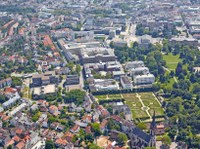Conference Venue
Address of the University
Technische Universität Darmstadt
Schlossgartenstr. 9
64289 Darmstadt
For more information regarding the conference venue please refer to the menu to the left.
City of Darmstadt
Darmstadt is a city in the state of Hesse in Germany, located in the southern part of the Rhine-Main-Area (Frankfurt Metropolitan Region). Darmstadt has a population of approximately 150,000 (2013). The Darmstadt Larger Urban Zone has 430,993 inhabitants.Darmstadt holds the official title "City of Science" (German: Wissenschaftsstadt) as it is a major centre of scientific institutions, universities and high technology companies. The European Space Operations Centre (ESOC) is located in Darmstadt as well as GSI Centre for Heavy Ion Research, where the chemical element Darmstadtium (atomic number 110) was discovered.
Darmstadt was formerly the capital of a sovereign country, the Grand Duchy of Hesse and its successor, the People's State of Hesse, a federal state of Germany. As the administrative centre of an increasingly prosperous duchy, the city gained some international prominence. In the 20th century, industry (especially chemicals) as well as large science and electronics (later information technology) sectors became increasingly important, and are still a major part of the city's economy. Darmstadt also has a large tertiary education sector, with three major universities and numerous associated institutions. It is also home to SV Darmstadt 98, which, after finishing second in the 2. Bundesliga during the 2014-15 season, earned promotion to the 1. Bundesliga for the 2015-16 campaign.
(Source: Wikipedia)
A brief overview of Darmstadt (image booklet) can be downloaded from http://www.darmstadt-tourismus.de/fileadmin/Downloads/Broschueren/willkommen_in_darmstadt.pdf
A city map with information on the major sights of Darmstadt is available under http://www.darmstadt-tourismus.de/fileadmin/Downloads/Broschueren/sehenswuerdigkeiten_darmstadt.pdf
Free (german) audioguides for Darmstadt are available from http://www.darmstadt.tomis.mobi/ - also for tours by tram.
TU Darmstadt
Since its foundation in 1877, TU Darmstadt has played its part in addressing the urgent issues of the future with pioneering achievements and outstanding research and teaching.TU Darmstadt focusses on selected, highly relevant problem areas. Technology is at the heart of all our disciplines at TU Darmstadt. The Natural Sciences as well as Social Sciences and Humanities cooperate closely with Engineering.
In order to expand its expertise strategically, TU Darmstadt maintains a variety of partnerships with companies and research institutions. It is a vital driving force in the economic and technological development of the Frankfurt-Rhein-Neckar metropolitan area.
Our excellent research has been recognised by multiple grants within the Excellence Initiative. Our graduates enjoy an excellent reputation in the business world. Our outstanding performance makes us one of the leading universities of technology in Germany and has earned us international visibility and renown. At present it is one of the world's top 100 universities for engineering and technology according to both THE World University Rankings and QS World University Rankings.
(Source: https://www.tu-darmstadt.de/universitaet/selbstverstaendnis/index.en.jsp)
TU Darmstadt’s research performance is proof of competence that is internationally visible and competitive. Its strategic and distinctive research profile focusses on six profile areas. One of these profile-defining research topics is the Cluster Nuclear and Radiation Science: The focus here is on research with high-intensity electron, photon, heavy ion and antimatter beams. Therefore, TU Darmstadt runs the superconducting Darmstadt electron linear accelerator S-DALINAC and supports the building of the international “Facility for Antiproton and Ion Research” (FAIR) as one of the major investments in large-scale research in Europe.

